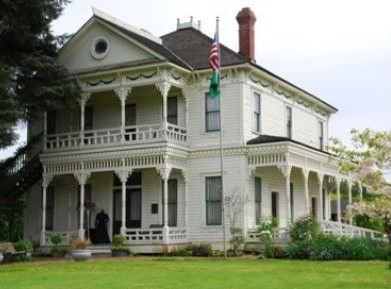Ghostly Voices

By Alice Winship
Chorus: Ghostly voices drifting down the hall
Listen on the stairs, you can hear them call
They came here looking for a better life
In the days long gone
Each family sunk deep roots in the land
They built their lives where the old house stands
The sun came up and the sun went down
And the years roll on
Listening in the night, the old house hears
The sound of voices echo down the years
A train of wagons rolling cross the Plains
Brought a boy to the land of trees and rain
When he was grown a man he owned a farm
With orchard trees and a dairy barn
He built a tall white house on his own farmstead
Porches edged with gingerbread
Songs and dancing rang in the evening light
The Neely parties would go on all night
Chorus
The Neely family left and moved to town
New immigrants now worked the ground
From Switzerland and Sweden’s shore
They leased the house but they wanted more
They saved enough to buy their own land
Then Fukudas came who were from Japan
They had a thriving dairy making lots of cash
They lost it all in the Wall Street crash
Loaded up a truck and said goodbye
Drove off down the road with tearful eyes
Chorus
The Hori family rose in the early dawn
The times were hard and the hours long
There were crops to raise and fruit to pack
Built a Japanese bath as a place to relax
A Filipino then leased the land
The house was a home for the hired hands
The farm workers lived on hope and dreams
Sending money home to the Philippines
Listening in the night, the old house hears
The sound of voices echo down the years
Chorus
Notes
Near the Green River outside of Auburn, Washington, a white, two-story farmhouse has stood since 1894. Over the years, five different families from various ethnic backgrounds lived there and farmed the land. The house was neglected for decades, but was rescued and restored, and is now known as the Neely Mansion. It is rumored to be haunted, or perhaps that is in the minds of visitors who can imagine the lives of those who lived and worked there. This song was inspired by a short film about the house called “If These Walls Could Talk”.
Immigration to a new land is a common theme that links the families together. The house was built by Aaron Neely, who came with his parents on the Overland Trail from Tennessee when he was five years old. By 1891 he was a prosperous landowner with a 284-acre farm. He built the house as a showplace of Victorian gingerbread decorations, a home for his family and a place for social gatherings with music and dancing. A fancy etched-glass window over the front door was ordered and shipped around the Horn. Aaron and Sarah Neely only lived in the house about 15 years before they moved into Auburn, where they could have electricity and indoor plumbing.
The Neelys rented the house and farm to a series of tenants. The first were Ernst Galli from Switzerland and Hannah Simu Galli from Sweden. They were newly married when they moved into the house, and their two sons, Teddy and Arnie, were born there. The Galli family wanted to buy the house and farm, but Aaron Neely was proud of his achievement in building the showplace house, and would not sell. The Galli’s bought their own farm north of Auburn.
Matasuke Fukuda and Tonki Nakamura Fukuda, of Japanese descent, were the next tenants. As Asians they were prevented by the state constitution from becoming citizens, so they could not own land. They and their 11 children operated a very successful dairy, until the Wall Street Crash of 1929 wiped out their business. They had all their money deposited in a bank that failed. The Fukuda family decided to go to California to make a fresh start. In 1933, the federal government created the FDIC to insure funds deposited in banks, which has since prevented the kind of tragedy that struck the Fukudas.
The next renters, Shigeichi and Shimanoko Hori, built a furoba, a Japanese bathhouse, behind the house, where the entire family could relax after a long day. He worked at a packing plant while she did the farming and their daughter sold fruit from a roadside stand. Their two young sons set fire to the house while playing with matches, but the fire was quickly extinguished without much damage. In 1936, they decided to move into town and operate a store, where the whole family could work together.
A few members of the Neely family moved back into the house, so when Pete Acosta and June Johnston rented the farm during World War II, they and their daughter lived in a small house nearby. He was of Pilipino background, while she was of European descent. After the Neelys moved out, the house became a dormitory for single Pilipino farm workers. The film tells the story of one of them, Ace, who tried to save money to bring his wife and son to the United States. The Acostas successfully farmed the land until they retired in the 1980s.
By now, the house no longer looked like a showplace. Auburn High School exploited the creepy atmosphere to operate it as a Halloween haunted house. Over the course of 30 years, the house was slowly transformed from a derelict into a restored living history museum.
For more information: http://www.neelymansion.org/
Credits
- Written by: Alice Winship
- Arranged by: Alex Sturbaum
- Chris Roe: lead vocal
- Mary Wilson: harmony vocal
- Alex Sturbaum: guitar
